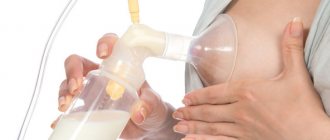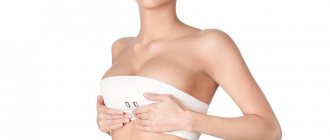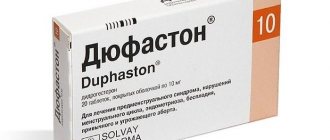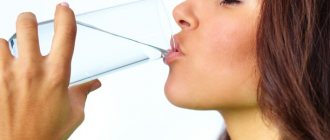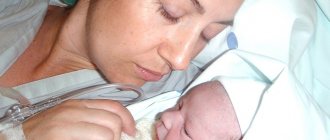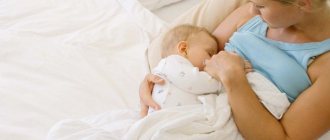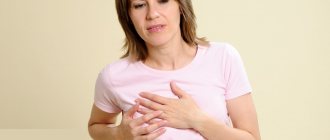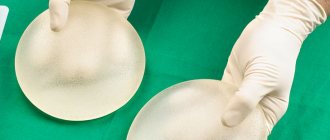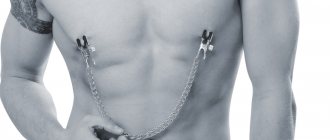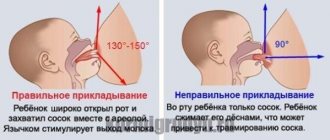To wash or not to wash – that is the question
A nursing mother should determine for herself whether she needs to wipe her breasts before each feeding - here you can listen to expert advice and recommendations from experienced women. There are two versions - daily and constant washing of the breasts before each feeding and only maintaining hygiene.
The first version is constant washing
Women who have just given birth begin to protect their child from everything associated with possible infection. Starting from daily washing of diapers and ironing them, ending with washing the breasts before each feeding of the baby. These women adhere to the rule that a huge amount of bacteria and microbes accumulate on the breast between feedings, which subsequently lead to intestinal disorders in the child. To avoid this, they prefer to wash their breasts not just with water, but with scented soap or a special solution. Such actions often cause the formation of cracks due to drying of the rather thin and vulnerable skin of the areolas. Enduring pain and suffering, young mothers persistently continue to wash their breasts with soap, which in principle is now necessary. When cracks form, women have to use special creams and ointments, which must be washed off before each feeding of the baby.
This is interesting: Some young mothers have experienced the development of thrush in the baby’s mouth due to lack of constant breast washing before feeding. As a result, they were forced to reconsider their hygiene and subject their nipples to tests with chlorinated water and alkaline soap.
The second version is that you shouldn’t wash your breasts every time.
The second version about washing your breasts while breastfeeding is more similar to reality and significantly reduces the hassle of daily child care. So, most experts advise young mothers only to maintain hygiene, but here the concept is somewhat disjointed with constant washing. You should not wash your breasts before each feeding of your baby, since sensitive nipples and areolas are rubbed with a towel and exposed to an alkaline composition, which increases their sensitivity and soreness.
Moreover, constant washing is prohibited due to the increased risk of developing an inflammatory process. As a result of constant exposure to the nipples, they become painful, red, and inflamed, which is why feeding the baby leads to suffering. At the same time, the areolas “thinner” and dry out, resulting in the formation of cracks, often bleeding. Such feeding ends in unbearable pain for the woman. Some young mothers, seeing such consequences of hygiene, stop breastfeeding their baby altogether, welcoming artificial feeding with the constant opportunity to disinfect the bottle nipple.
This is important: Abrupt cessation of breastfeeding in a newborn leads to a decrease in immunity and an increased risk of developing diseases. As a result, early care of the baby results in significant and more serious problems, both for the parents and for the child as a whole.
A little about hygiene
Gynecologists and obstetricians advise women to adhere to hygiene rules during breastfeeding.
Such as:
- It is enough for a young mother to take a shower every day using special soap for nursing women - the soap contains part of the cream, sometimes glycine, there is no fragrance at all;
- after washing, the breasts are not rubbed with a towel, but only gently soaked;
- wear clean underwear every day - special for feeding, which contains a soft outer layer that prevents injury to the nipples;
- Before feeding, it is enough to wash your hands with soap;
- to avoid infections, you should express a few drops of breast milk, and only then put the baby to the breast;
- immediately after feeding, do not wipe off the remaining milk - it should be absorbed into the areolas, which will moisten them with their natural environment at the moment;
- To keep your underwear clean, it is better to use special pads that absorb milk, preventing the development of pathogenic microorganisms.
This is important: The breasts should be thoroughly treated only if there are cracks and inflammatory processes. Not only ointments are used here, but also special antiseptic solutions that are used to treat the breasts before each feeding.
Do I need to wash my breasts before every feeding?
The nipple is surrounded by a pigmented area of skin in the shape of a circle, on which small anatomical bumps are located - the Montgomery glands. The purpose of these tubercles is as follows:
- Natural lubrication. Since the skin of the mammary glands is very thin and delicate, it needs to be moisturized and protected. The secretion secreted by the glands provides care for the injured area of the nipple and areola. Its constant removal leads to skin damage, cracks and wounds.
- Mom's scent. According to research, the smell of secretory secretions is very similar to amniotic fluid, which has become a familiar habitat and development for the baby. It is this aroma that gives the child a feeling of closeness to his mother, a sense of security and comfort. The smell attracts the baby to attach itself to the nipple and start feeding.
- Antibacterial barrier. The fluid secreted by a woman’s body creates a protective layer on the skin that prevents the penetration of harmful microorganisms and infections.
So, if mommy does not work and does not have significant physical activity, then it is enough to take a shower twice a day or wash the mammary glands with warm water. There is no need to destroy the protective layer created by nature. The exception is the use of medications. In this case, the breasts must be cleaned before feeding.
Can't there be too much cleanliness?
When a baby is born, it first becomes acquainted with microbes. And microbes are present almost everywhere here! They live in the mother’s arms and on her chest; microbes even live in the air. Having entered a world overpopulated with these invisible microorganisms from a practically sterile environment, a little person cannot help but be exposed to contact with them. Although doctors always warn that acquaintance with microbes must be done gradually. That is why in the first weeks it is recommended to limit the contact of the newborn with strangers, all the baby’s clothes should be ironed with a hot iron, and household items should be thoroughly washed and wiped with disinfectants. What about natural feeding?
The times are not that far gone when doctors insistently demanded that a child be placed in a completely sterile environment after birth. The mother could feed the baby by tying her hair with a scarf and putting a gauze bandage on her face, and they even required her to smear her breasts with brilliant green. And, of course, it was necessary to wash the breasts with soap both before and after feeding. What can we say, such meticulous care for mother and child yielded its “fruits”: nipples cracked, mastitis developed, the baby resembled frogs with “war” paint... But the number of infectious diseases in infants did not decrease at all.
As it is now?
Today, doctors are well aware that placing a baby in a germ-free vacuum is not only difficult to implement practically, but also unsafe for the developing immune system. And to the question of whether you need to wash your breasts before feeding, a competent specialist will give a detailed answer.
It is we, adults, who make sure to eat from clean dishes. It's not just about culture and etiquette. Bacteria grow on a dirty plate, and they are quite harmful. Bacteria also live on the mother's breast. However, they can be called harmful very conditionally.
Bacteria that live on nipples enter the baby's body through the mouth. And there they begin to work for the benefit of the baby, populating the intestines, creating microflora in it. And the nipples themselves, thanks to these microorganisms, are protected from the invasion of pathogenic microorganisms.
What happens if a young mother does not know whether to wash her breasts before each feeding, and exposes this part of the body to excessively frequent water procedures? All beneficial microbes are washed away, and under the influence of soap, the nipples dry out and crack. Harmful microbes penetrate through these cracks (from the mother’s hands, from her underwear, from the child’s saliva). Hence - mastitis and other inflammatory diseases of the mammary glands.
To wash or not to wash?
Of course, you can’t not wash your breasts at all. But washing 1-2 times a day with soap is considered quite sufficient. At the same time, you should not choose expensive fragrant soap, just as you should not go to the extreme of using laundry or tar soap. The best option is baby toilet soap. You can rinse your breasts before feeding with water at room temperature if, for example, the mother came in from outside or was sweating.
In some cases, you will still have to wash your breasts with soap before each feeding if the mother:
- uses ointments and creams to heal nipple fissures.
- the baby is sick (intestinal infection, stomatitis, acute respiratory infections).
There is no need to wash your nipples after feeding. Just blot them with a napkin and apply protective cream. It is acceptable to lubricate your nipples with breast milk and let them dry in the open air before putting on a bra.
Breastfeeding strengthens the emotional bond between mother and baby, provides the newborn with necessary substances, and builds immunity. Therefore, many women are determined to breastfeed their baby for as long as possible. But often when lactation begins, young mothers have many questions:
1. Will I be able to breastfeed my baby?
The answer is clear: it will work! Every healthy woman is able to naturally breastfeed a baby, regardless of breast size, body type, or age. This requires the desire of the mother herself. If you doubt your abilities, you need to familiarize yourself with the technique of breastfeeding, and the formation of lactation will be successful.
2. If milk does not come in in the first days, do I need to supplement with formula?
There is no need to supplement feeding a newborn. In the first days, the mother secretes colostrum; it has high nutritional value. Therefore, even a few drops of it are enough for a newborn to be saturated. In addition, supplementary feeding reduces the number of breastfeedings, which delays the mother's milk supply. Put your baby to your breast as often as possible on demand and the milk will arrive soon.
3. The baby is losing weight - does that mean he’s not getting enough to eat?
When discharged from the hospital, all babies weigh less than at birth. This does not depend on the amount of milk the newborn consumes. Weight loss is associated with the following reasons:
- Release of fluid through the skin;
- urination;
- Passage of original feces (meconium);
- Stress of a newborn: from a warm, cozy tummy he found himself in a huge unknown world.
A weight loss of up to 10% of body weight at birth is considered normal; usually, after returning home, the baby will quickly gain back what was lost.
4. How often to breastfeed a newborn?
Feed your baby on demand: offer the breast when he becomes restless. In the first days, the baby may need the breast every 30 minutes. When milk comes in, the intervals between feedings become longer, but will not immediately be regular, or equal to 3 hours (as some believe). Feeding on demand will ensure the production of the amount of milk necessary for the baby.
5. Do I need to express milk between feedings?
When feeding on demand, no additional pumping is required. At first, there may be more milk than the baby needs, but over time this will normalize. You need to express milk in the following cases:
Note to moms!
Hello girls) I didn’t think that the problem of stretch marks would affect me too, and I’ll also write about it))) But there’s nowhere to go, so I’m writing here: How did I get rid of stretch marks after childbirth? I will be very glad if my method helps you too...
- When the baby does not breastfeed, or is separated from the mother for health reasons;
- When there is too much milk and engorgement of the mammary glands occurs, or begins;
- When there are deep painful ones;
- When the mother takes medications that are contraindicated during breastfeeding.
6. How long should a baby breastfeed?
The baby will nurse as long as he needs. Sucking time can range from 5 minutes to 2 hours. In one case, the baby wants to eat, in another - to drink, in the third he simply needs his mother’s warmth.
7. Do I need to wash my breasts before feeding?
There is no need to do this. It is enough to take a daily shower with regular baby soap. Do not use deodorized and antibacterial products: they often cause allergies in babies and neutralize beneficial bacteria. If you are sweating or have excessive milk leakage, you can simply rinse your breasts with warm water immediately before feeding.
9. Is it necessary to give a newborn a supplement of water?
No, a newborn does not need water, because breast milk consists of 90% of it. Even colostrum can completely satisfy a baby’s thirst. Water has no calories, so it may cause additional weight loss or insufficient weight gain.
10. Does the baby have enough milk?
You can find out about this in two simple ways:
- Number of urinations. An infant should have 12 or more of them per day. Urine is colorless or pale yellow, odorless. This criterion is true if the child is not given additional water or medication.
- Weight gain. A healthy baby gains weight by at least 120 g per week (excluding the time spent in the maternity hospital), the monthly gain can range from 0.5 to 2 kg (Read also:
Hygiene for a nursing mother is very important not only for the woman’s body, but also for the newborn. Most young mothers, due to their inexperience, do not know how often they need to wash their mammary glands or what products to use. This article will be a source of useful information for women and will tell you whether you need to constantly wash your breasts before each feeding of your baby.
Breast hygiene is one of the discussed topics in the modern world. Many ladies diligently wash and cleanse their breasts before each feeding of the baby, thereby thinning and drying out the delicate skin.
On average, a child needs fifteen to twenty times a day to be satisfied. Of course, if you expose the mammary glands to water and hygiene products every time, in the near future the condition of the skin will become deplorable, discomfort, pain, and peeling will occur.
Do I need to wash my breasts before every feeding?
The nipple is surrounded by a pigmented area of skin in the shape of a circle, on which small anatomical bumps are located - the Montgomery glands. The purpose of these tubercles is as follows:
- Natural lubrication.
Since the skin of the mammary glands is very thin and delicate, it needs to be moisturized and protected. The secretion secreted by the glands provides care for the injured area of the nipple and areola. Its constant removal leads to skin damage, cracks and wounds. - Mom's scent.
According to research, the smell of secretory secretions is very similar to amniotic fluid, which has become a familiar habitat and development for the baby. It is this aroma that gives the child a feeling of closeness to his mother, a sense of security and comfort. The smell attracts the baby to attach itself to the nipple and start feeding. - Antibacterial barrier.
The fluid secreted by a woman’s body creates a protective layer on the skin that prevents the penetration of harmful microorganisms and infections.
So, if mommy does not work and does not have significant physical activity, then it is enough to take a shower twice a day or wash the mammary glands with warm water. There is no need to destroy the protective layer created by nature. The exception is the use of medications. In this case, the breasts must be cleaned before feeding.
Do I need to treat my breasts before breastfeeding?
Despite previous and current beliefs about the need to wash the breasts every time before feeding, the standard has now been adopted throughout the world according to which it is not necessary to wash the breasts and nipples before and after feeding. This is not only pointless, but also harmful, since it leads to washing away the protective lubricant that is produced by the glands located in the areola area - around the nipple. Lubricant protects nipples from drying out and injury. In addition, it turns out that this lubricant is similar in smell to the amniotic fluid in which the baby was in the womb. If the breast is washed very often, the protective layer is washed off and the mucous membrane of the nipple is easily damaged. Regular washing of the breasts once or twice a day with cool water without soap is sufficient (it can have a drying effect or give the breast an unfamiliar smell to the baby and provoke his refusal to breastfeed). This is especially important in the first days of lactation.
There is also no need to lubricate nipples and areolas with brilliant green or other disinfectants, since, in addition to the drying effect and increasing the likelihood of cracks, these drugs destroy the beneficial microflora of the skin.
Mom's hygiene
The first days after birth, the baby is especially susceptible to external factors, so for two weeks of breastfeeding, ensure the mammary glands are rested and clean.
Wash your breasts no more than three times daily with moderately warm, clean water or using baby bath products. To dry, use an individual towel, wash and dry it regularly. After feeding, apply moisturizing and protective preparations to the nipple area.
After half a month of a child’s life, his immunity will become slightly stronger. Then you can switch to using one towel for the whole body. Of course, it should be washed at least twice a week and the hygiene item should not be used by other family members.
During the entire period of breastfeeding, women can wash their mammary glands with a short contrast shower; this stimulates lactation and ensures elasticity and firmness of the skin. You need to use underwear made from natural fabrics and of a suitable size.
You should avoid tightness, rubbing, and squeezing of the mammary glands. It is advisable to remove your bra for several hours to allow your skin to rest. Breast pads should be changed as often as possible, bed linen should be changed at least once a week.
Regarding the application of caring cosmetic creams and lotions to the body after water procedures, it is worth introducing a restriction on the chest area or cleansing the skin before feeding the baby. Most doctors recommend avoiding the use of antiperspirants and perfumes for the first time, since foreign odors can cause fear and allergic reactions in the child.
What is the best way to wash your breasts?
For breast hygiene, it is recommended to use low-alkaline products. It is permissible to occasionally wash your breasts with baby soap or a product for bathing newborns.
You can use a fragrance-free intimate hygiene product to cleanse the skin of your breasts, but you need to rinse the skin thoroughly so that the product does not leave any traces.
You can clean the surface of your breasts while outside the home using special wet wipes.
Scented soap
Today, breastfeeding experts say that washing your breasts and nipples with soap before each feeding is completely unacceptable. Young mothers are lost in the abundance of advice and recommendations. Representatives of the older generation advise young people to wash their breasts with laundry soap before feeding and even smear them with brilliant green. Our grandmothers motivate this by the fact that dangerous microbes can get into the child’s mouth and the baby will definitely get sick with some terrible disease. Whether it is necessary to wipe or wash the mammary glands before feeding, we will ask the specialists.
Numerous studies in recent years have shown that it is not advisable to treat the breasts with additional products before each feeding. Today, scientists authoritatively declare that with a normal schedule of hygiene procedures (twice a day), no microbes are dangerous to the child. But endlessly washing the breast with soap can, on the contrary, harm the baby.
Immediately after childbirth, special beneficial microbes settle on the breast halo, which help create healthy microflora in the baby’s intestines. Moreover, these microorganisms are also antiseptics. Beneficial microorganisms on the areola are native to the baby, because these are the mother’s bacteria and they are the ones that are best suited for the newborn.
Thanks to these microorganisms, the child develops immunity and healthy intestinal microflora. Moreover, microbes are an excellent prevention of intestinal diseases and dysbiosis.
Washing your breasts before each feeding may be justified only if you are using any medications. For example, if you use healing ointments for your nipples, they, of course, need to be washed off before feeding.
Antiseptics
Antiseptic solutions are also not recommended before feeding. These medications can only be used as prescribed by a doctor and only between feedings. Nipples should be treated with drugs that are safe for the child and should be prescribed by a doctor.
Even a seemingly harmless drug like furatsilin can cause a child to refuse to breastfeed. All solutions wash away not only beneficial bacteria, but also the smell of the mother. But it is by smell that a child recognizes his mother among other family members. Hearing the smell of the mother, the baby calms down and prepares for calm feeding. The absence of this identification mark can lead to complete refusal of the breast.
How to treat nipples
Since gynecologists and obstetricians advise disinfecting nipples and areolas only if there are cracks, it is important to know how to treat your breasts before feeding your baby. From the above, it became clear that doing this constantly is not recommended in order to avoid complications, but it is necessary in certain cases.
So, if a young mother already has cracks in her nipples and areolas, she should use ointments like “Bepanten” and “Purelan”. These special formulations do not require subsequent disinfection or even rinsing. Just gently wipe the chest with a napkin and boiled water. In order not to injure the damage even more, it is better to use silicone pads.
Practical advice: If a woman wants to protect her child from the penetration of cream substances into the body, she should wash the treated surfaces with soap with a neutral pH. It is advisable to use liquid soap, which is less concentrated and therefore less likely to dry out the skin. You should not use fragrances at all - this will lead to the emergence of new odors, causing the child to worry and not even touch the nipples.
Some women “abuse” hygiene, preferring to use special solutions in the form of furatsilin or an alcohol-containing composition. Yes, such protection will not harm the health of a young mother, but doing this before feeding is strictly prohibited. The baby may not touch the nipples and even experience stress, since alcohol completely interrupts the mother’s natural smell. If you still want to use more effective antiseptics, do it 1-1.5 hours after lubricating the nipples with cream. Put your baby to your breast one hour after disinfection. If your baby refuses to breastfeed, squeeze out a few drops and lubricate the nipples and areolas. If the baby does not immediately take the nipple, wait a while - let the entire skin be soaked with milk. Whether or not to wash your breasts before feeding is the business of every woman, so you should be guided here only by individual aspects in caring for your child. If there is such a need due to the deterioration of the baby’s health, excessive hygiene should not be neglected, even if the doctor is categorically against it. It is important to follow the situation that has arisen and pay more attention to the child, and only then to speculation and prejudice.
Tips for caring for nipples while breastfeeding
- Only wash your breasts with water when you shower or bathe. Small bumps on the areolas (Montgomery glands) secrete oil that moisturizes and protects your nipples. Soaps and shower gels can strip away this natural protection, causing dryness and irritation.6
- Gently pat your nipples dry with a soft towel or simply let them air dry. In the past, women were often advised to rub their nipples to make them harder, but fortunately such advice is a thing of the past!
- There is no need to wash your breasts or nipples before feeding. The bacteria that live on the surface of the breast actually help the baby's gut flora develop.7
- Fresh breast milk helps heal cracked nipples,8 so rub a few drops of milk into them before and after feeding.
- Change your bra pads frequently if they become wet. This will reduce the risk of bacterial and fungal infections, including thrush.6
- There is no need to increase the intervals between feedings to give your nipples a “rest.” In order for a child to be healthy and grow well, he needs to be fed on demand. Remember, frequent feeding stimulates and maintains milk production, so continue feeding despite pain.9
Useful products for nipple care
- Nipple treatment made from pure lanolin, a natural product obtained from sheep's wool. It moisturizes and promotes nipple healing. This cream is safe for the baby, so it does not need to be washed off before feeding.
- Hydrogel pads* can be placed on sore nipples to relieve pain during feeding and help speed healing. They can even be stored in the refrigerator to enhance the soothing cooling effect.
- Breast pads* fit into your bra. They help prevent nipple irritation from rubbing against clothing and have special air holes to help the nipples heal.
- Nursing bras** are made from breathable material such as cotton or special fabric that dries quickly and wicks excess moisture away from sore nipples.
- Nursing shields* are special silicone covers that fit over your nipples. They have small holes through which milk flows when you breastfeed. The shields help protect the skin underneath and help your baby latch onto the nipple better by making the nipple firmer. Do not use nursing pads for long periods of time. If you have problems or pain, contact your healthcare professional or lactation consultant.
Scented soap
Today, breastfeeding experts say that washing your breasts and nipples with soap before each feeding is completely unacceptable. Young mothers are lost in the abundance of advice and recommendations. Representatives of the older generation advise young people to wash their breasts with laundry soap before feeding and even smear them with brilliant green. Our grandmothers motivate this by the fact that dangerous microbes can get into the child’s mouth and the baby will definitely get sick with some terrible disease. Whether it is necessary to wipe or wash the mammary glands before feeding, we will ask the specialists.
Numerous studies in recent years have shown that it is not advisable to treat the breasts with additional products before each feeding. Today, scientists authoritatively declare that with a normal schedule of hygiene procedures (twice a day), no microbes are dangerous to the child. But endlessly washing the breast with soap can, on the contrary, harm the baby.
Immediately after childbirth, special beneficial microbes settle on the breast halo, which help create healthy microflora in the baby’s intestines. Moreover, these microorganisms are also antiseptics. Beneficial microorganisms on the areola are native to the baby, because these are the mother’s bacteria and they are the ones that are best suited for the newborn.
Thanks to these microorganisms, the child develops immunity and healthy intestinal microflora. Moreover, microbes are an excellent prevention of intestinal diseases and dysbiosis.
Washing your breasts before each feeding may be justified only if you are using any medications. For example, if you use healing ointments for your nipples, they, of course, need to be washed off before feeding.
Read also:
Why milk leaks and which pads are best for breastfeeding
Do I need to wash my breasts after Bepanthen?
To regenerate the skin of the mammary glands, as well as to prevent the formation of cracks and bleeding wounds, gynecologists and dermatologists recommend using the broad-spectrum product Bepanten.
The drug is available in the form of cream and ointment. The active component is dexpanthenol, a derivative of pantothenate, more familiar to us as vitamin B5. Penetrating into the deep layers of the skin, the drug promotes cell regeneration and restoration of collagen fibers.
The developers claim that it is absolutely safe for the body of the mother and baby, so it is not necessary to constantly wash the breasts before feeding after applying Bepanthen.
To confirm these words, we present the main composition of the medicine:
- dexpanthenol - a derivative of vitamin B5;
- almond oil – moisturizing and soothing effects;
- lanolin is an auxiliary component that creates a barrier between the skin of the mammary glands and external factors (it is isolated from sheep wool fat);
- additional substances:
- beeswax;
- soft paraffin;
- purified water;
- cetyl and stearyl alcohols (natural elements synthesized from palm oil or whale fat);
- Protegin X is an emulsion thickener.
If you experience discomfort or do not trust the manufacturers’ conclusions, then before breastfeeding, wash your breasts with warm water. It is advisable to apply Bepanten immediately after the remaining milk has dried on the nipple, since the therapeutic effect lies in the regular use of the drug.
Proper breast care for a nursing mother
Of course, no one argues that a nursing mother needs to monitor her hygiene more carefully than before. The main thing is to find a middle ground and not go to extremes.
For mom, a daily shower becomes mandatory, maybe twice a day - morning and evening.
You shouldn’t use strong-smelling shower gels or scented soaps; they can overwhelm your baby’s mother’s scent or he may simply not like them.
It is also not recommended to use deodorants during the entire period of lactation. In hot weather, to get rid of the smell of sweat, you can rinse your armpits with water before feeding.
By the way, it is not recommended to wash your breasts not only before, but also after feeding. The remaining milk moisturizes the delicate skin of the nipples and prevents damage. In addition, they serve as a kind of natural antiseptic.
It is very important to choose the right special bras for the breastfeeding period. Ideally, this is a nursing bra, suitable in size for the mother, made from natural materials. And preferably not one, but at least 2-3. They need to be washed regularly, especially if milk is leaking, and ironed.
Before picking up your baby, you need to wash your hands. It is on them, and not on the chest, that bacteria accumulate, which will be harmful and dangerous for the baby.
The most important component of care is the correct attachment of the baby to the breast. Violation of technology can provoke a bunch of problems for both mother and baby - starting with colic and ending with the transition to artificial formulas.
Cracks in the nipples also do not appear due to improper attachment.
For them to appear, sometimes it only takes one or two times to fail to ensure the correct grip, but it will take a long time to treat them, and the pleasure from feeding will decrease.
To ensure that the feeding process brings only pleasant moments to both mother and baby, it is very important to trust nature and be able to find the golden mean in the matter of hygiene. Not all advice is equally useful; not everything and not always needs to be washed and disinfected when it comes to a child. When in doubt, it is always best to consult your doctor.
Hygiene for a young mother
Of course, the daily hygiene of a nursing mother should be more thorough. Showers should be taken 2 times a day, morning and evening. Due to the fact that it is not recommended to use deodorants during the entire period of breastfeeding, you need to make sure that there is no smell of sweat. An unpleasant odor can irritate your baby.
Read also:
When should you express milk after breastfeeding?
It is also very important to wash your hands with soap before handling your baby. It is on the hands that pathogenic bacteria accumulate, which can be dangerous for the baby.
Keep your linen clean. Especially if your milk leaks between feedings. The bra needs to be changed daily. All linen must be not only washed, but also ironed.
Please note that breastfeeding women should only wear special bras. They perfectly support the breasts and prevent disruption of milk flow. Linen should be made only from natural fabrics. Avoid colored underwear. Dyes can settle on the nipples and get into the baby's mouth, which can cause allergic reactions in the baby.
The size of the underwear should correspond to the size of the chest. If your breasts have enlarged, it is better to buy a new bra that will be comfortable.
Also carefully monitor the cleanliness of your baby’s clothes. If your baby burps on his clothes after feeding, you need to change him immediately. Following these simple hygiene rules will protect your child from harmful germs and viruses.
The danger of excessive cleanliness for mom
Frequently washing your breasts with soap and treating your nipples with antiseptic solutions is dangerous not only for the baby, but also for the mother. Soap and alcohol solutions can remove the natural protective layer from the nipples. The skin on the nipples and areola is very thin and delicate. Excessive drying will inevitably cause cracks and discomfort.
Rubbing with a towel also has an unfavorable effect on the nipples. On many Internet sites you can find advice to rub your nipples with a towel after a shower. Many women who followed this advice, like those who listened to their grandmothers, have already regretted their gullibility.
The delicate skin of the nipples is injured by intense friction with a towel, which causes cracks that are very difficult to cure. Moreover, cracks that appear can become infected, and then treatment will be even more difficult.
Air and water hardening
Air baths are very beneficial for the chest.
Usually, the air temperature remains virtually unchanged under clothing. If you take off your clothes, the skin begins to experience lower temperatures - this will be a wonderful exercise for the chest vessels. In addition, air baths will help the muscles of the mammary glands relax, rest, and the skin cells to breathe. You can also do contrast dousing of the mammary glands, it allows you to increase the flow of milk to the breast if necessary. True, such douches are suitable only for those women who previously loved hardening procedures. These simple rules of hygiene and care will help you avoid abrasions and cracked nipples, as well as painful sensations during feeding.
And breastfeeding experts advise against washing your breasts with soap before each feeding. This will dry out the skin, cause cracks and make feeding an unpleasant experience. It will be enough to take a shower and change your underwear every day. Washing your breasts too often leads to disruption of the microflora in the area around the nipple, which can trigger inflammatory processes. Use pH-neutral liquid soap for breast hygiene. After a shower, do not rub your breasts with a towel, as this will injure your nipples. Instead, blot it with a clean, soft cloth.
If there are no cracks or injuries, treating the nipples with disinfectant solutions is not necessary. Such products dry out the skin, eliminate its natural smell and taste, and this is very important for the baby. Foreign odors make the baby worry, and he may refuse to breastfeed. Before feeding, be sure to wash your hands with soap and then express a few drops of milk to remove any pathogens that may have gotten in from your clothing.
Do not wash away any milk remaining on your nipples after feeding. As it dries, it will be absorbed into the skin, moisturizing it and preventing cracking. During lactation, wear special bras that do not squeeze or press against enlarged breasts. You can put special pads in this linen that collect leaking milk and prevent your clothes from getting dirty. It is recommended to wear nursing clothing that allows easy access to the breasts.
What to do if your nipples are damaged
If abrasions or scuffs appear after feeding, treat the nipples with a special cream or ointment (for example, Bepanten, Purelan). Before the next feeding there is no need to wash off these preparations, just wipe the nipples with boiled water. For small cracks, use special silicone pads when feeding. Expressing your breasts with a breast pump can injure your nipples and lead to swelling, so you should only express them if your baby is unable to breastfeed. If the cause of cracked nipples has been eliminated, you can get rid of them without stopping feeding. To do this, squeeze out a drop of milk after feeding and lubricate the nipple with it, wait 15 minutes for the milk to dry. Then lubricate the nipples with Panthenol ointment or Bepanten cream; there is no need to wash them off before the next feeding. For faster healing, you can also use vegetable oils (peach, olive, sea buckthorn), animal oils (butter, freshly rendered unsalted fats).
How to prepare your breasts for feeding
Before the birth of a child, the expectant mother begins to worry: how to prepare her breasts for feeding. Is this necessary to do in principle or will nature do everything for the woman? It is an indisputable fact that you need to cook. There is even a separate profession - a consultant for preparing and establishing the breastfeeding process. We'll tell you the secrets of properly preparing your breasts for feeding.
Breastfeeding plays an invaluable role. Firstly, it contains everything that a tiny person needs to grow and develop. Secondly, breast milk serves as a source of antibodies for almost six months - they protect against diseases and help develop immunity. Some women have no problems: the milk comes and remains for the required period.
Sometimes a young mother is ready to give everything to be a wet nurse for her own baby - milk either does not come or comes in very small quantities. They ask themselves a thousand questions, they don’t know what to eat to get their milk flowing and how to treat their breasts before feeding. But we can fix everything! The main thing is to remain calm and act in stages.
Why is it important to prepare your breasts for feeding?
Why prepare your breasts for upcoming feeding if this is a natural physiological process? About half of mothers who decide to feed their baby on their own face the following problems:
- chest pain;
- burning;
- the appearance of cracks in the nipples;
- discharge of blood from the nipples.
All this is a consequence of the lack of preparation of the breast for feeding. First of all, preparatory procedures are necessary for owners of flat or inverted nipples. The baby does not experience any difficulty in grasping the protruding nipple, but if the shape of the organ is different and the skin of the areola does not stretch well, then difficulties may arise.
How to check nipple shape? You need to lightly squeeze the areola between your thumb and index finger. If the nipple bends inward, then the breast should be prepared for lactation.
General recommendations
Breastfeeding experts urge you to remain sensible, not listen to “grandmother’s advice,” and prepare your breasts throughout your pregnancy. There is no special wisdom: just follow simple recommendations.
Rules:
- maintain hygiene;
- periodically massage your breasts;
- lead a healthy lifestyle;
- do exercises - even simple gymnastics will do.
Sometimes modern inventions come to the rescue: special pads, maternity underwear, breast pumps. Not everyone can use them. How and what to do correctly, and when, we will tell you in the sections below.
Possible mistakes
Young mothers often ask older relatives for advice on how to care for their breasts during breastfeeding. Not all recommendations are useful, and out of ignorance you can make mistakes that will only aggravate pain and irritation.
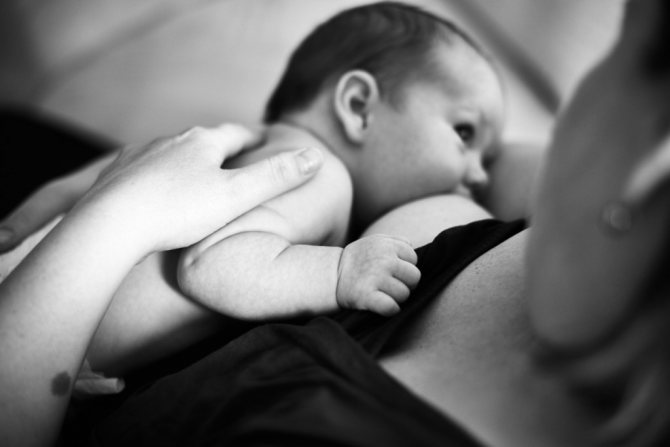
What you should never do:
- Roughly rub your nipples with a towel or washcloth. Such actions injure delicate skin, leading to bleeding and cracks.
- Apply ice to your nipples to relieve itching. This can cause colds in the mammary glands.
- Use alcohol lotions to heal cracks. The ethyl alcohol they contain contributes to irritation.
- Treat nipples with antiseptics. The smell and taste of such products discourages the baby from breastfeeding. The baby refuses to eat, goes hungry, and begins to have health problems.
- Retract flat and concave nipples. A light massage won't hurt, but you don't need to massage or pull them intensely. During gestation, such exposure increases the tone of the uterus and can cause premature birth.
- Place inserts made of coarse fabrics into the bra. Several decades ago they did this to roughen the skin. However, rough fabric does not tighten the skin of the nipples, but leads to irritation.
Is washing your breasts after feeding good or bad?
The need to cleanse the mammary glands after feeding only arises if the baby burps food on you. Then you definitely need to wash your chest with warm water, since the result of belching will become the basis for the emergence of an infection.
In normal cases, it is not recommended to clean the breast after breastfeeding, because the remaining milk is absorbed into the nipple, providing a moisturizing and protective effect. In addition, the secretion of the parapapillary glands is produced in limited quantities and additionally protects the skin.
